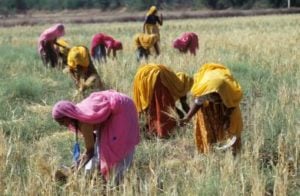 The Global Conference on Women in Agriculture, which aimed at discussing women’s critical role in food production and promoting gender sensitive agricultural research, was held in New Delhi, India from March 13th to the 15th .
The Global Conference on Women in Agriculture, which aimed at discussing women’s critical role in food production and promoting gender sensitive agricultural research, was held in New Delhi, India from March 13th to the 15th .
According to the United Nations Food and Agriculture Organization (FAO) and Farming First, women, on average, constitute 43% of agricultural workers in developing countries and as much as 75% of the agricultural workforce in countries like Kenya and Uganda. However, most agricultural researchers are men who tend to focus more on fostering productivity than considering women’s lifestyles and preferences. For example, while some crop varieties may produce bigger yields, they are difficult for women to harvest while caring for children. The conference discussed how conducting gender sensitive research incorporating these concerns can enhance the output of women farmers.
Another major impediment for women farmers in many countries is the inequality in property laws and resource distribution. This disparity diminishes women’s productivity and may explain why increasing the amount of food produced in South Asian countries, such as India, has not led to improvements in nutrition for the population. Research from the FAO shows that if women had comparable access to resources like land, fertilizers and technology, the increase in food production could reduce the world’s hungry by 12% to 17% With greater success with their crops, women could raise their incomes, and as primary caregivers in many developing societies, elevate the nutrition of children in their care.
The conference brought together researchers, policy makers, women farmers and other stakeholders in hopes of developing strategies “for addressing gender issues in agriculture at the local, national, regional and global level.”
Posted by: Yeketerina Fomitcheva
Image credit: Mark Edwards, Hard Rain Picture Library